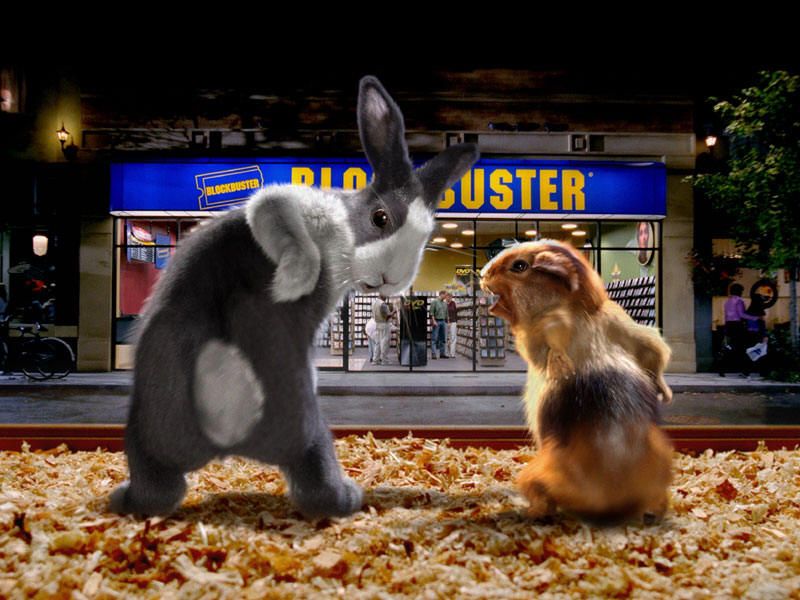
My son was born in the Year of the Rat and so it's only fitting that I pay tribute to one of the most humble and misunderstood creatures in the world. According to Suki Falconberg Ph.D., in labs, rats are tortured beyond misery and suffering--forced to ingest poisons until they vomit their insides out; forced to run on treadmills in sleep deprivation experiences until they die bleeding from their orifices; starved in 'obesity' experiments; continuously burned and shocked in other worthless experiments, costing hundreds of thousands of dollars, to teach them 'learned helplessness'.
Laboratory rats are imprisoned in small barren cages where they go insane from having no place to run in the few inches of space allotted them. The mobile rats--the ones not near death from metal implanted in their brains, or catheters sticking out of their infected stomachs--engage in 'stereotypic behavior': they run back and forth in frantic desperation, shaking with jumpiness, trying to escape from their metal prisons.
Earlier this year, I attended a Rodent Workshop at the San Francisco SPCA http://www.sfspca.org/ and met a couple of charming rats. Rats are extremely self-aware and express a variety of different emotions. Rats laugh when you tickle them and will keep coming back for more. Rats dream as we dream. Their dreams are filled with images of navigation and escape attempts. When scientists at the Massachusetts Institute of Technology tracked the neuronal activity of rats in REM sleep, the scientists saw the same firing patterns they had seen in wakeful rats navigating their way through a maze.
Rats love to nestle in blankets and get cozy. When you pet them and speak gently and softly to them, rats sigh and snuggle deeper into their blankets. Rats are sociable, curious and love to be touched. According to James G. Pfaus of Concordia University in Montreal, rats know what good sex is and what bad sex is. When they have reason to anticipate great sex, they give you every indication they're looking forward to it. They wiggle and paw at their ears, hop and dart, stop and flash a come-hither look backward.
Rats love to nestle in blankets and get cozy. When you pet them and speak gently and softly to them, rats sigh and snuggle deeper into their blankets. Rats are sociable, curious and love to be touched. According to James G. Pfaus of Concordia University in Montreal, rats know what good sex is and what bad sex is. When they have reason to anticipate great sex, they give you every indication they're looking forward to it. They wiggle and paw at their ears, hop and dart, stop and flash a come-hither look backward.
Rats have personalities, and they can be glum or cheerful depending on their upbringing and circumstances. One study showed that rats accustomed to good times tend to be optimists, while those reared in unstable conditions become pessimists. Both rats will learn to associate one sound with a good event--a gift of food--and another sound with no food, but when exposed to an ambiguous sound, the optimistic rat will run over expecting to be fed and the pessimistic rat will grumble and skulk away, expecting nothing.
In another recent study, Jonathon D. Crystal, a psychologist at the University of Georgia in Athens, and his colleague Allison Foote discovered that rats display evidence of metacognition: they know what they know and what they don't know. Metacognition, a talent previously detected only in primates, is best exemplified by the experience of students scanning the questions on a final exam and having a pretty good sense of what their grade is likely to be. In the Georgia study, rats were asked to show their ability to distinguish between tones lasting about 2 seconds, and sounds of about 8 seconds, by pressing one or another lever. If the rat guessed correctly, it was rewarded with a huge meal; if it judged incorrectly, it got nothing.
For each trial, the rat could, after hearing the tone, opt to either take the test and press the short or long lever, or poke its nose through a side of the chamber designated the, "I don't know" option, at which point it would receive a tiny snack. During the trials, the rats made clear they knew their audio limits. The closer the tones were to either 2 or 8 seconds, the likelier the rats were to express confidence in their judgment by indicating they wanted to take the lever test and earn their full-course dinner. But as the tones edged into the ambiguous realms of 4 seconds, the rats began opting ever more often for modest but reliable morsels of the clueless option.
Swiss researchers put pairs of female sister rats in a cage, separating them with a wire mesh. In one half of the cage, a rat could pull a lever attached to a baited tray that would deliver food to her sister, but not to herself. Each rat was trained in alternate sessions, first as a recipient of food, then as a provider. The sisters learned to cooperate, and they pulled significantly more often when their littermate was present than when the other half of the cage was empty.
Then the researchers put rats who had recently been assisted by their partners, and rats who had not recently been helped, in with unfamiliar and unrelated rats. Those who had recently been helped were about 21% more likely to pull the lever for the new partner. This was not just ordinary operant conditioning or reinforcement, the researchers maintain, because the rats were never rewarded for their own behavior, only that of others. Because the rats were unfamiliar and unrelated, there was no family interaction involved. The only plausible explanation, they believe, is that the rats had developed what they call generalized reciprocity — that is, they were generous even with an unknown partner because another rat had just been kind to them.
I wonder why so many humans are obsessed with proving, or disproving, that animals have feelings and thoughts. Maybe it is because we are the species with hearts and minds that are "two sizes too small."
Sources: The New York Times and Suki Falconberg Ph.D.




No comments:
Post a Comment